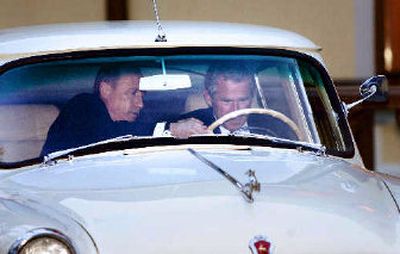U.S. reviews Russia policy

WASHINGTON – The Bush administration is quietly exploring ways of recalibrating U.S. policy toward Russia in the face of growing concerns about the Kremlin’s crackdown on internal dissent and pressure tactics toward its neighbors, according to senior officials and others briefed on the discussions.
Vice President Dick Cheney has grown increasingly skeptical of Russian President Vladimir Putin and shown interest in toughening the administration’s approach. He summoned Russia scholars to his office last month to solicit input and asked national intelligence director John Negroponte to provide further information about Putin’s trajectory, the sources said.
Secretary of State Condoleezza Rice, who has sought to balance worries over Russian democracy with a pragmatic partnership on mutual issues such as Iran’s nuclear program, responded by calling her own meeting with outside advisers a week ago. Some involved in the administration deliberations saw the move as an attempt to counter Cheney. Senior officials deny any split but describe the views of Cheney and Rice in different terms.
“He’s basically in the more critical camp,” said one person familiar with the vice president’s thinking, speaking on the condition of anonymity because of the sensitivity of the discussions. “You have this tension between the Putin lovers and the democracy lovers in the administration. And the president himself and Condi seem to be balancing between these forces.”
The fresh interest stems from the fact that Russia for the first time will host the annual summit of the Group of Eight (G-8) powers this year. The G-8 is supposed to be a club of the world’s leading industrial democracies, but by standard measurements, Russia is neither. It has an economy the size of the Netherlands’, and the Kremlin has taken over independent television, canceled the election of governors and otherwise stifled opposition.
Critics charge that Putin’s leadership of the G-8 summit makes a mockery of the organization, and some, such as Sen. John McCain, R-Ariz., have called for the United States to boycott. Officials in London, Paris and Berlin also worry the St. Petersburg summit in July will prove an embarrassment and are conferring about how to avoid appearing to endorse Putin’s leadership.
“The G-8 summit in St. Petersburg is becoming the focal point for everybody to reconsider where we are in terms of Russia,” said Anders Aslund, a Russia specialist at the Institute for International Economics who was among those who briefed Cheney last month. “Is this really where we want to be? Should we change policy?”
Cheney has weighed in, but it is not clear whether he has recommended specific actions. “They argue for a kind of realism about the problem,” a senior official said of the vice president’s office. Rice agrees about the problem but wants to be frank without being hostile.
Administration spokesmen declined to comment on the record about internal deliberations.
Another person close to the discussions said Rice, a Russia scholar, privately believes that pushing Putin too hard on democracy would be counterproductive, and views the issue as a distraction from higher priorities. “You get the impression it was annoyance more than anything else – ‘we got so many other things to think about, we don’t need this,’ ” the person said.
The administration is boxed in partly because of President Bush’s enthusiastic embrace of Putin when they met in 2001 and the American president declared he had gotten a sense of the Russian leader’s soul. Although Bush has since taken a less sanguine view, he has been unwilling to abandon Putin, especially after Russia allowed U.S. forces into Central Asia following the attacks of Sept. 11, 2001.
Russia has exacerbated concerns with recent actions. The Kremlin enacted a law restricting non-governmental organizations, closed some human rights groups and accused others of being fronts for foreign spies. Moscow also briefly cut off natural gas to Ukraine in a politically charged dispute that alarmed the rest of Europe, which gets a quarter of its gas from Russia.